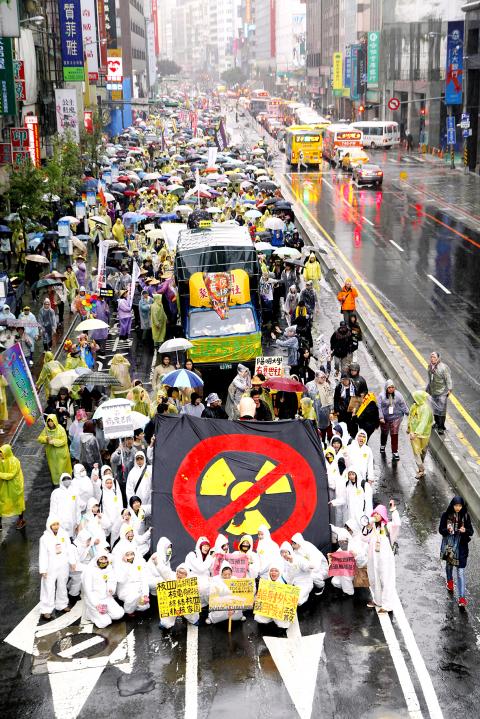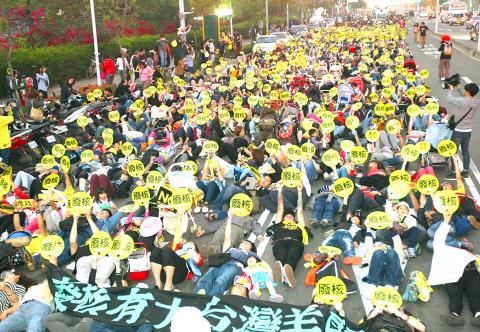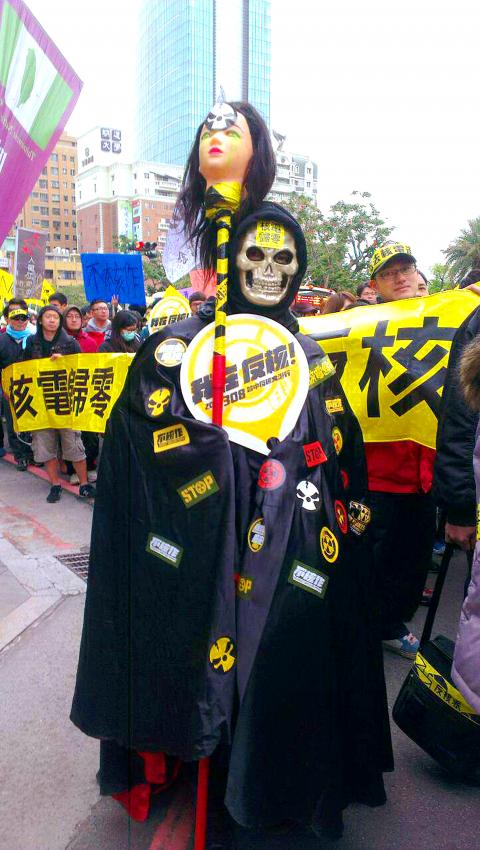Tens of thousands of people braved the rain yesterday afternoon to take part in nationwide demonstrations calling for an end to nuclear power plants in Taiwan.
The protests, staged three days ahead of the third anniversary of the Fukushima Dai-ichi nuclear disaster in Japan, took place simultaneously in Taipei, Greater Taichung, Greater Kaohsiung and Taitung.
The National Nuclear Abolition Action Platform — the event’s organizer, an alliance of more than 100 civic groups — demanded that the government immediately halt construction of the Fourth Nuclear Power Plant in New Taipei City’s Gongliao District (貢寮) and remove nuclear waste from Orchid Island (Lanyu, 蘭嶼).

Photo: EPA
The group asked lawmakers to cut the budget allocated for the new plant, pass a resolution calling for an end to nuclear power and amend the Referendum Act (公民投票法) to lower the referendum threshold.
In Taipei, a woman using a wheelchair held a handmade sign that read: “In a nuclear disaster, people in wheelchairs cannot escape,” while gender and gay rights advocacy groups held rainbow-colored signs that read: “We want orgasms, not nuclear waste” and “We may not have the same sexual preference, but we have the same anti-nuclear opinion.”
Dozens of young people danced to loud electronic dance music as they paraded while shouting: “My electro music does not want to use electricity generated by nuclear energy; my party does not fear oppressive authority.”

Photo: Huang Chih-yuan, Taipei Times
“How can I not stand up today,” said a 76-year-old fisherman surnamed Lu (盧) from New Taipei City’s Jinshan (金山), adding that he has lived in Jinshan all his life, with his home only about 5km from the plant, between two operating nuclear power plants.
“I didn’t know there were so many spent fuel rods in the plants until we had the chance to visit one of them, and I became worried, because the spent fuel pools are almost full. Will they take the fuel rods out of the water?” Lu said. “We have nowhere to run to if a disaster occurs and Taipei will be in danger.”
A highlight of the parade yesterday took place at the intersection of Zhongxiao W Road and Zhongshan S Road, where a group of residents living near nuclear facilities, young people, artists and civic groups stopped traffic by lying or sitting down on the road, as a fake nuclear accident siren sounded.

Photo: Hsu Kuo-chen, Taipei Times
The action prompted police intervention.
Green Citizens’ Action Alliance secretary-general Tsuei Su-hsin (崔愫欣) said that since the Fukushima Dai-ichi accident, annual anti-nuclear parades in Taiwan held in 2011, 2012 and last year all showed that most of the public are against nuclear power.
“The government is still stubbornly ignoring public opinion. When it wanted to push nuclear power, it said the policy was already decided and it was only acting according to the law, so people living near the facilities had no right to refuse. Now the government is using our tax money to threaten and lie to us, when it should communicate with the public and let us decide,” she said.
Tsuei said this year will be the beginning of a “citizens won’t cooperate” movement, which would make an oppressive government understand that “Taiwan doesn’t want nuclear power, the people can decide their own future.”
According to the event’s organizers, the Taipei protest drew more than 80,000 people, while other rallies held simultaneously across the country had a combined turnout of more than 50,000.
The nation has three active nuclear power plants that generate about 20 percent of its electricity.
The state-run Taiwan Power Co (Taipower, 台電) yesterday said that the Fourth Nuclear Power Plant will meet the highest safety standards before beginning operations.
Taipower vice president Chen Pu-tsan (陳布燦) said a safety review of the plant’s 126 systems is expected to be completed by the end of June, after which a report will be submitted to the Atomic Energy Council for review.
Chen stressed that passing safety inspections is just one of 75 requirements that the power plant needs to meet before fuel rods can be installed in its No. 1 reactor.
Additional reporting by AFP and CNA

Intelligence agents have recorded 510,000 instances of “controversial information” being spread online by the Chinese Communist Party (CCP) so far this year, the National Security Bureau (NSB) said in a report yesterday, as it warned of artificial intelligence (AI) being employed to generate destabilizing misinformation. The bureau submitted a written report to the Legislative Yuan in preparation for National Security Bureau Director-General Tsai Ming-yen’s (蔡明彥) appearance before the Foreign Affairs and National Defense Committee today. The CCP has been using cognitive warfare to divide Taiwanese society by commenting on controversial issues such as Taiwan Semiconductor Manufacturing Co’s (TSMC, 台積電) investments in the

HELPING HAND: The steering committee of the National Stabilization Fund is expected to hold a meeting to discuss how and when to utilize the fund to help buffer the sell-off The TAIEX plunged 2,065.87 points, or 9.7 percent, to close at 19,232.35 yesterday, the highest single-day percentage loss on record, as investors braced for US President Donald Trump’s tariffs after an extended holiday weekend. Amid the pessimistic atmosphere, 945 listed companies led by large-cap stocks — including Taiwan Semiconductor Manufacturing Co (TSMC, 台積電), Hon Hai Precision Industry Co (鴻海精密) and Largan Precision Co (大立光) — fell by the daily maximum of 10 percent at the close, Taiwan Stock Exchange data showed. The number of listed companies ending limit-down set a new record, the exchange said. The TAIEX plunged by daily maxiumu in just

‘COMPREHENSIVE PLAN’: Lin Chia-lung said that the government was ready to talk about a variety of issues, including investment in and purchases from the US The National Stabilization Fund (NSF) yesterday announced that it would step in to staunch stock market losses for the ninth time in the nation’s history. An NSF board meeting, originally scheduled for Monday next week, was moved to yesterday after stocks plummeted in the wake of US President Donald Trump’s announcement of 32 percent tariffs on Taiwan on Wednesday last week. Board members voted to support the stock market with the NT$500 billion (US$15.15 billion) fund, with injections of funds to begin as soon as today. The NSF in 2000 injected NT$120 billion to stabilize stocks, the most ever. The lowest amount it

NEGOTIATIONS: Taiwan has good relations with Washington and the outlook for the negotiations looks promising, Minister of Economic Affairs J.W. Kuo said Taiwan’s GDP growth this year is expected to decrease by 0.43 to 1.61 percentage points due to the effects of US tariffs, National Development Council (NDC) Minister Paul Liu (劉鏡清) said at a meeting of the legislature’s Economics Committee in Taipei yesterday, citing a preliminary estimate by a private research institution. Taiwan’s economy would be significantly affected by the 32 percent “reciprocal” tariffs slapped by the US, which took effect yesterday, Liu said, adding that GDP growth could fall below 3 percent and potentially even dip below 2 percent to 1.53 percent this year. The council has commissioned another institution